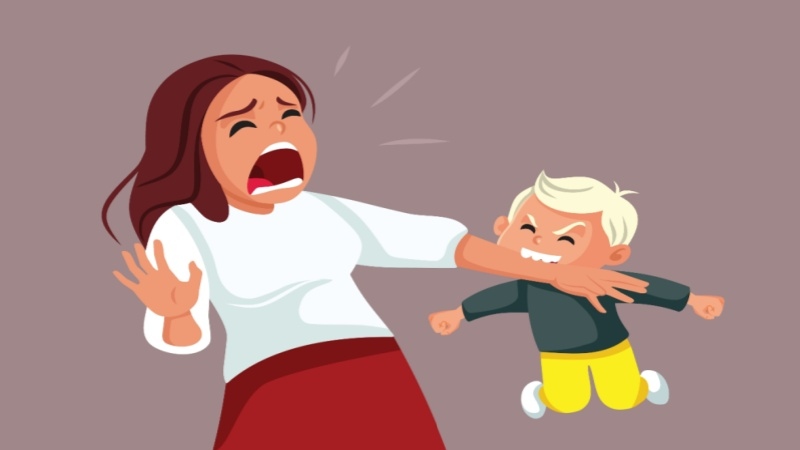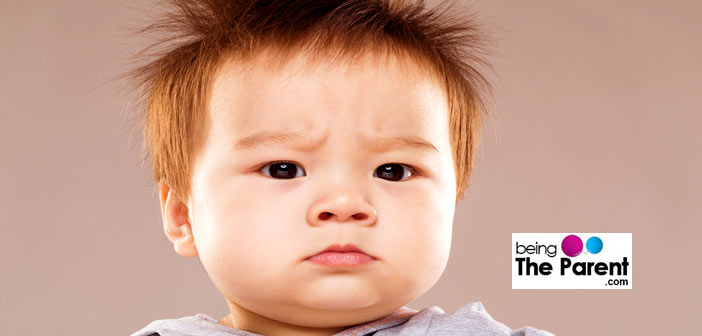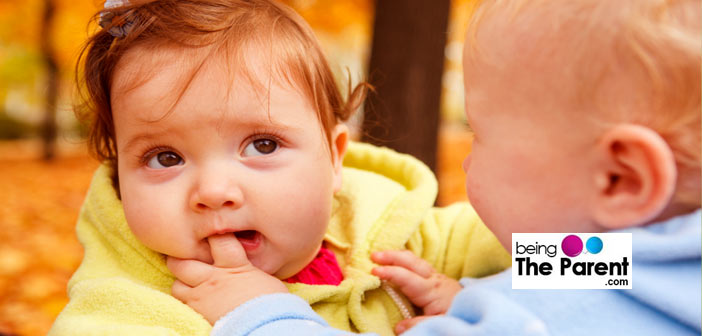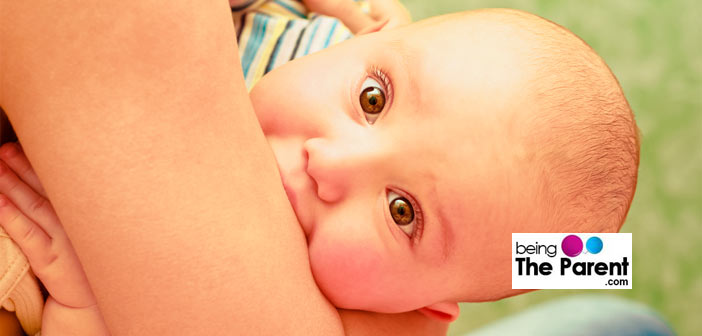
If you have searched for this topic and have come across this webpage, it is because your little toddler has started biting you, others in the family and/or other children. And you are mighty worried. So let us make this clear first – your baby is not the only little Dracula out there. Biting in toddlers is a common occurrence.
It is a painful and frustrating one; and many parents are dealing with it . The bad news is that it can lead to many awkward conversations if the “bitten” is another child. The good news is that with careful observation and handling, you can help your child overcome this habit. The first step is to understand why your child bites.
Why Do Babies And Toddlers Bite?
Toddlers do not bite because they decide to bite. It is something as natural as the urge to pee by the body, and a very normal pasrt of childhood development. When a sudden wave of emotions engulfs a toddler, feelings of fear and frustration are released by biting. The toddler by himself does not plan it, his brain and body do so for reasons that are beyond his control. Here are some reasons why your cutie pie resorts to biting you or others:
- It is a way of expression: Your baby is not as good as you when it comes to expressing anger, frustration or even happiness. Your precious might just resort to biting when he experiences feelings he is not sure how to put in words. Since generally boys have a smaller vocabulary than girls, you see biting more common in boys than girls
- He is exploring and experimenting: Your baby is a very curious creature. Biting might be a form of experimentation where he/she is trying to figure out various reactions/responses a biting can result in. They don’t perhaps understand it can inflict pain
- Biting implies ‘I want ATTENTION’: Most of the negative behaviors – like shouting in public, beating and biting – can be one way your child is trying to get your attention
- Pain- like when teething: Your baby must be getting a new teeth, must be in pain because of swollen gums and want to relieve the pain by biting into different surfaces, including, unfortunately, other people’s skin
- The fear of getting hurt: A toddler may bite if he feels that he is in danger and someone is going to cause him harm or hurt him. A toddler uses biting as a defense mechanism
- Change in routine: A major change in a toddler’s life, like a new city or a new baby can also make him bottle up emotions and turn aggressive
- They want a reaction: Sometimes toddlers want to see how you react when they bite. They are curious as to what reaction will be provoked by their actions. The surprise element, the fear, the exclamation, the anger etc., is all a part of curiosity learning for your toddler
A biting phase starts somewhere around a child’s first birthday, and lasts till about 2.5-3 years, when a child is learning to communicate. Once the child is able to speak and make others understand his needs and wants, biting usually stops, though if your child has developed a habit of hitting, it may well persist for a long time. However, biting definetly needs to be discouraged, and fortunately, there are some simple ways to prevent your little one from sinking his teeth in everything and everyone.

How Can I Prevent Your Toddler From Biting?
Just as in beating, the best way to prevent your child from biting is to restrain him from doing so. Labeling him as a ‘biter’ and going all aggressive on him will only make the matters worse.
- Identify what triggers biting: This means that you need to recognize your child’s “biting triggers” (as mentioned in the previous section). For example, if your child is teething, make sure you have a cool soothing ring to relieve him. Or if it is a particular situation that triggers biting, you can either avoid such situations (e.g. your child gets upset in a crowd) or be on alert when he/she is in one – ready to stop them through distraction. Always ensure that your baby’s needs like hunger and sleep are met profusely and not compromised
- Watch and observe your child: Look for signs when your toddler seems frustrated and resorts to lots of crying and irritation. Make sure your child gets enough of your time and attention so that the biting does not happen just to get your attention. Observe if it is a particular situation that causes frustration in your child and watch out for the cues. These cues will help you push your child away from any situation that might be causing emotional triggers in him
- Restrain yourself: It might as well seem natural to burst out your own emotions, but the best way to deal with a toddler who bites is to stay loving and show warmth to him. Hitting a child never dissuades a situation, but only makes it worse. Be firm that biting is not acceptable, and encourage the use of other ways to help the child vent out his frustrations – like boxing a pillow. Do stop him from biting, but ensure he always has the feeling that you are with him
- Never, ever bite back: If you have been told to bite your toddler back so as to show him biting is painful, your child will actually get the idea of being aggressive. And if you thought those little smacks are a cute way to love your child, well, they aren’t. If you feel biting back will make the child know the pain, we’d like to state that it does not work that way. the child gets the idea that biting is okay and is an acceptable behavior
- Shift attention: Handing a fruit like an apple or a biting toy to a toddler who can bite is an effective way to shift his attention and save someone else. Let him sink his teeth into some substitute that leaves him satisfied

However, all these methods are short-term solutions. What you really need to work towards is to get your baby out of this habit permanently and help your child grow.
How To Prevent Biting In Toddlers?
If you think that biting occurs when your baby is overwhelmed with some emotions that he/she cannot express with their limited language capabilities, then teach him/her ways to express:
- “If you are angry, tell “Mumma, I am angry” and then we will see how to make you happy again.”
- “Are you excited? You can put your hands up, jump and say “Yaay!!”.”
- “Do you want that car? Ask your friend “please can you share it with me?”
- If he/she is not ready to speak full sentences, you can say: “If you are upset you can give mumma a tight hug and I will know”
If you think your child is experimenting, explain to him that biting hurts. Describe to him some of the aftermaths in simple words: “If you bite your friend, it will hurt her. She will cry. You like her – you don’t want her hurt and crying, do you?”
If you think your child is feeling ignored and is craving for attention, then this is definitely NOT the time to give him/her attention as this will only reinforce the thinking that biting would mean ‘mumma will focus on me’. Instead, shift the focus of your concern and sympathy to the bitten child or adult. Additionally, try to understand why your child is feeling ignored and give extra attention so that he/she feels secure and happy.
If your child is teething, then biting is more physical and temporary than behavioral. Give your child something to bite into like a cooling teething ring.
What are the Do’s and Don’ts When Your Child Bites?
Apart from these techniques, here are some broad do’s and don’ts:

- Do not get angry or punish the kid. This will only harm your child and make him want to bite again. Calm yourself before reacting
- Do not bite the child to teach him/her that it hurts
- Do not give long explanations on why a child should not bite. Your child is too young to understand this
- Do provide an immediate, non-emotional feedback, like “No biting. It hurts.”
- Do encourage consistency in your child’s daily schedule. This will help them be more secure and happy
- Do not label him/her as a “biter” in front of others
How Can I Help My Toddler Release His Tensions Productively?
If you thought biting releases all your child’s tension, then you are wrong. A child feels bad after he has bitten himself, which again adds to his loads of tension and frustration. When a child bites someone, try to get close to him and comfort and reassure him. Look deep into his eyes, make firm eye contact and tell him you are there for him. Let him feel your warmth and and though he may not give you words of explanation, what may come across is either bouts of laughter (which is again a great way to release inner tension) or crying. Be there for the time he cries and connect with him. As he wriggles away to yet another experiment, he will be at peace with himself.
When To Take the Biting In Toddlers Seriously?
Kids normally stop biting once they turn 3-3.5, by when they would have mastered the language well enough to express most of the feelings they experience. If your child continues to bite, in an increasing frequency, despite the fact that he is past the age to have such triggers, then you might want to talk to a child development specialist.

